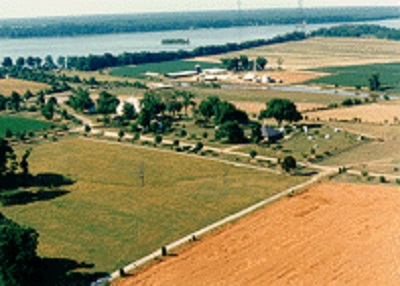
Courtesy of Flowerdew Hundred Foundation
Flowerdew Hundred is a 1,000 acre tract of land along the James River that was patented to Sir George Yeardley in 1619. Sir Yeardley, the Governor and Captain General of Virginia, was married to Temperance Flowerdew. The hundred had a population of about 30 and was a successful tobacco plantation. Flowerdew also produced corn, fish, and livestock. Sir Yeardley paid 120 pounds to build the first windmill in colonial Virginia at Flowerdew.
Flowerdew survived the Indian Massacre of 1622, with only six deaths. It remained an active and fortified private plantation. In 1683, a secondary settlement, Flowerdew Towne, was formed down river. Unlike Flowerdew Hundred, the new settlement was not successful within the plantation economy. Joshua Poythress purchased a part of Flowerdew that was shelled by General Benedict Arnold in 1781. After the Revolutionary War, the plantation was reformed by John Vaugn Willcox. He married the last Poythress heiress and bought the surrounding lands that had been sold off from the original land grant. In 1804, the Willcox's built a new house on the high ridge overlooking the fertile bottom lands along the James. In 1864, the Civil War came to Flowerdew under the command of General Ulysses S. Grant. Grant ordered his men to cross the James River in an effort to outflank General Robert E. Lee and capture the city of Petersburg.
The original land grant contains over 60 archeological sites, ranging from Archaic period Native American encampments to homesteads from the 1900s. Archeological investigations revealed that the site was first inhabited by Native American groups 11,000 years ago. The archeological excavations were supported by David Harrison III, from 1975-2000. James Deetz, a renowned historical archeological provided a synopsis of the results of these excavations in Flowerdew Hundred: The Archaeology of a Virginia Planation, 1619-1864.
Flowerdew was listed on the National Register of Historic Places on August 1, 1975 and the Virginia Landmarks Register on May 20, 1975. The plantation is no longer open to the public. However, four miles south of the plantation there is an historical marker. Artifacts recovered during archaeological investigations are on display at the University of Virginia Library. The Albert and Shirley Small Special Collections Library at the University of Virginia is located at 160 McCormick Rd, Charlottesville, VA 22904. For more information about the archaeology at Flowerdew please visit: Flowerdew Hundred Archaeology or call (434) 243-2390.
Last updated: August 16, 2017
